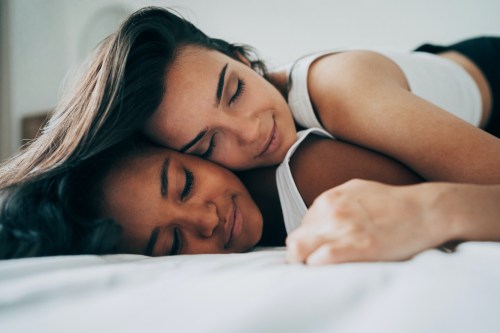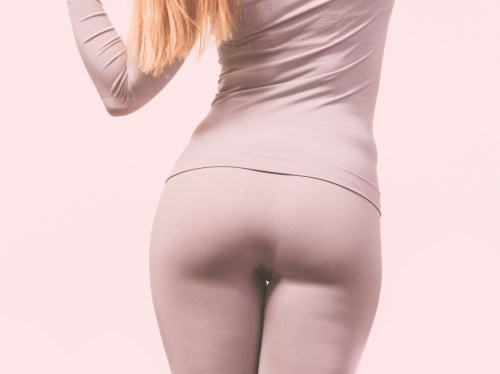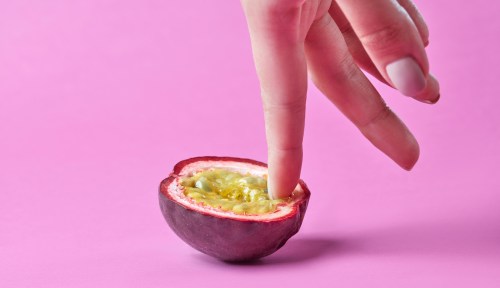Our editors independently select these products. Making a purchase through our links may earn Well+Good a commission
When You’re Queer, What Does It Mean To Lose Your Virginity?
Society upholds heteronormative views on what constitutes sex, and it's invalidating to the queer community. So what is queer sex? Learn more here.

“The first time I ever hooked up with anyone, it was a girl—two of them,” said Miley Cyrus on an episode of the Call Her Daddy podcast earlier this year. Cyrus, who is outspoken about being queer, went on to say, “I didn’t go all the way with a dude until I was 16.” What she doesn’t say, though, is whether she considered the latter or former sexual experience to be her first time.
Experts in This Article
sex educator and founder of the Purity Culture Dropout Program
sex educator with Lovers and co-author of The Ultimate Guide To Seduction and Foreplay
So why did headlines (like this one and this one) summarizing the episode claim she said she lost her virginity to Liam Hemsworth (the “dude” in question)? Simple: by nature of the false assumption that Cyrus hooking up with a girl doesn’t count as sex. Mainstream American society upholds and perpetuates the idea that penetrative P-in-V intercourse is what constitutes sex, and it’s incredibly invalidating to members of the queer community. And that has to change.
Below, learn about the implications of a very narrow accepted view of what constitutes sex, plus what it means to have sex—and have sex for the first time—when you’re queer.
How sex education and media portrayals alike fail queer people
Currently, just nine states require that discussion of LGBTQ+ identities and relationships in sex education be affirming and inclusive. Worse, seven states ban educators from answering questions about LGBTQ+ identities and relationships, with some even mandating LGBTQ+ identities and relationships to be framed in a negative light.
A decade ago, those numbers were even more despicable; reports show that only about 12 percent of millennials had sex education classes that covered same-sex relationships at all. And unfortunately, “covered” doesn’t mean “covered well.” As queer femme Nona M., 24, puts it, “My sex education was like the Mean Girls line, ‘Don’t have sex, because you will get pregnant and die’ with an addition of, ‘Don’t have gay sex because you will get AIDs and die.’”
“The emphasis on penis-in-vagina sex in sex education is incredibly disenfranchising and stigmatizing for queer people.” —Marla Renee Stewart, sexologist
The messaging not only limits knowledge about the vast expanse of sexual experiences people have but also equips queer students with little information that’s actually pertinent to them. “The emphasis on penis-in-vagina sex in sex education is incredibly disenfranchising and stigmatizing for queer people,” says Marla Renee Stewart, sexologist with Velvet Lips Sex Down South and co-author of The Ultimate Guide to Seduction and Foreplay. “It under-values pleasure, over-values procreation, ignores consent, and completely erases all the other wonderful ways there are to have sex.”
Outside of the classroom, portrayals of sex aren’t necessarily any better. LGBTQ+ representation onscreen, for instance, is still pretty darn dismal. In 2018, only 18.2 percent of the 110 films GLAAD counted from the major studios included characters who identified as LGBTQ+. It does show progress (in 2013, GLAAD reported just 13.8 percent representation), but considering the growing representation of LGBTQ+ people in the country, 18 percent is unacceptably low.
Lack of LGBTQ+ representation onscreen means lack of inclusive portrayals of LGBTQ+ relationships and, yes, sex scenes, which can play a negative role in how people conceptualizes their own sexuality. “For every one girl-on-girl kissing scene I’ve seen, I’ve seen a thousand straight sex scenes,” says Olivia T., 45, for example.
When media makes clear—and to be sure, it does—that cisgender, heterosexual, penetrative sex is what constitutes normal, acceptable, real, and valid sex, “people who can’t have or don’t want to have that kind of sex feel less-than,” says Stewart. This narrow view of what “counts” as sex others members of the LGBTQ+ community, who are already 2.5 times more likely than heterosexual people to experience depression, anxiety, and substance misuse. “[This portrayal] invalidates the lived experience of people who do not sit within those gender, genital, or sexual boundaries and can contribute to senses of shame and low self worth,” says Max Slack, head of global partnerships at Her, a dating app for lesbian, bisexual, and queer people.
What is queer sex, and what does it mean to lose your virginity when you’re queer?
Cyrus was on to something when she posted on Instagram back in July 2019, “Virginity is a social construct.” Virginity is, more specifically, a heterosexist social construct. According to the World Health Organization, “’virginity’ is a social, cultural, and religious construct—one that reflects gender discrimination against women and girls.”
Indeed, the concept of virginity is not based in science. “We’re led to believe that when a person has P-in-V sex, the vagina-owner’s hymen ‘breaks’ or ‘pops,'” says sex educator Erica Smith. But that’s actually not true. The hymen is a thin membrane of tissue that stretches over the vaginal opening, and can thin or tear from common activities that have nothing to do with sex, like bike riding, for example. Basically, the state of the hymen has nothing to do with whether a person has experienced vaginal penetration or not. And furthermore, penetration is not a prerequisite of sex.
When it comes to what constitutes queer sex and all sex, what we should really be asking is what does it mean to have sex for the first time when you’re queer? And that answer comes down to how you define sex. “I define sex between queer people as contact with genitals,” says Slack. “Regardless of how the bodies look and feel, the intimacy that comes from making contact with areas of our bodies that aren’t usually on show represents the kind of intimacy and connection implied by the phrase ‘having sex.’” But, they add, “I think it’s important that queer folx be able to create their own definition of sex as they see fit.”
So did Cyrus have sex for the first time during her girl-on-girl-on-girl hookup? I can’t say, but I can say this: What constitutes queer sex is for queer individuals—not internet headlines—to decide.
Sign Up for Our Daily Newsletter
Get all the latest in wellness, trends, food, fitness, beauty, and more delivered right to your inbox.
Got it, you've been added to our email list.










